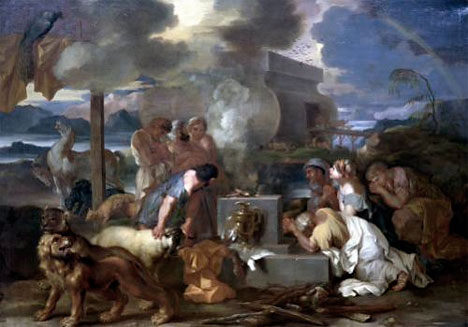The First Ascension

The analogy between human beings and animals, seen throughout the Bible, means that in the animal world there are some who represent the whole.
A Brief History of “Sacrifice” According to the Bible: Part 5
by James B. Jordan, Biblical Horizons No. 253 (subscribe at www.biblicalhorizons.com)
And Noah built a communion-site (altar) to Yahweh.
And he took from every clean animal and from every clean bird,
And caused ascensions to ascend on the communion-site.
And Yahweh smelled the pleasing aroma.
And Yahweh said in His heart, I will never again curse the ground (’adamah) because of the man (’adam)… (Genesis 8:20-21a)
This is the first altar, or communion-site, we see built by anyone in the Bible. Likely Seth and Enoch and Noah before the Flood had places where they brought their gifts to God, and these might have been elevated mounds reminiscent of the high ground of Eden, but it is only now, after the Flood, that we see the notion of some kind of communion between God and man. And this communion is linked to the sending up of sacrifices to God. The ascension from the top of the mound (altar) creates a ladder to heaven and makes possible this communion.
It is communion at a distance. Noah is on earth; Yahweh is in heaven. Much closer communion comes with Moses, so that a Peace meal is added to the Ascension, and the Ascension itself takes on the meaning of going up the ladder to be next to God. This is because God will come down and put His presence on the earth in the Tabernacle. This has not happened yet.
Noah sent up “clean” animals and birds. Noah had been told to take on the ark seven pairs of these clean animals, and only one pair of the “not clean” animals (Genesis 7:2). We should denotive that these are not “unclean” animals. The technical term “unclean” (tame’) does not show up until Leviticus 5, where it means something associated with death when in the presence of the tabernacled-presence of God or His special people. Here at the Flood the difference is between representative and non-representative animals. The clean animals are those who can be sent up to God to represent all the rest of the world.
This notion of representation has been hinted at already. It is clearly the line of Seth that is the priestly and representative portion of the human race (Genesis 4:4, 25-26). The analogy between human beings and animals, seen throughout the Bible, means that in the animal world there are some who represent the whole. We don’t know what animals and birds this group consisted of. Later on, chickens and deer are considered clean, but are not put on the altars of Israel, and it seems that the limitation of animals to just five happens with Abraham (Genesis 15). Noah may well have caused many different animals to ascend.
These clean animals are sent up to God in Ascension as signs that Noah is giving the whole world to Him. Noah can do this because he is the first true king under God. He has passed through death and resurrection in the Flood and has been given, thereby, a true foretaste of the benefits of the Tree of the Knowledge of Good and Evil. He has become “like God,” and will “know (judge) good and evil” when his “eyes have become open” (Genesis 3).
Noah has ascended through the Flood-exodus to a new world. He is on a mountaintop, like the original high ground of Eden. Like God, he plants a garden. This garden is a vineyard, producing a more advanced kind of fruit that will become wine, the symbol of kingly rest in the Bible. There comes a time when Noah retires from the scene to rest, as God did on the seventh day, leaving Adam and Eve alone. Noah returns to his sons, his eyes open from sleep, and passes godlike judgments on them, determining the course of their futures—creating their futures as it were.
Noah can do this because God has announced the coming of limited human kingship. People are now officially permitted to eat animal flesh (Genesis 8:3-4). Godly people may have been allowed to eat meat before the Flood, but now it is made official and part of God’s covenant with man. The blood of animals, however, may not be consumed; only the “blood of grapes” (Genesis 49:11). Moreover, men in kingly positions are now authorised to pass judgment of life and death (8:5-6), just as God passed a death judgment on humanity in the beginning.
This is Noah’s new position, it is what qualifies him to be the first to offer up an Ascension to God. Adam gave the world to the devil. Now, since the king has given the world to God, it belongs to Him, so He will not destroy it again even though men are as wicked as before. After Noah, all people are allowed to send up smaller Ascensions to God, one animal at a time, thereby giving their own small worlds to Him.

























